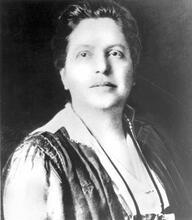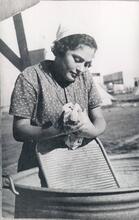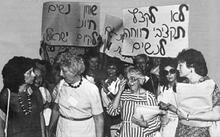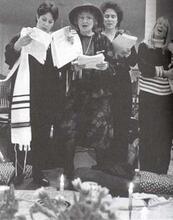Jenny Hirsch
Born to an impoverished Jewish family, Jenny Hirsch created financial stability for herself by founding a private interreligious school. In the 1860s, she became involved with the German women’s movement, first as editor of the General Association of German Women’s publication and later as a member of the Society for the Promotion of the Gainful Employment of the Female Sex, which established technical schools. When the Lette Society, an alliance of all German associations related to women’s work, was founded, Hirsch was made its secretary and editor of its monthly journal, the Women’s Advocate. In 1883 she broke with the Lette Society over its refusal to compensate her and became financially dependent on her own literary endeavors, producing light fiction and translations of feminist texts.
Early Life & Young Adulthood
No lucky star reigned over Jenny Hirsch’s youth. Born in Zerbst, Anhalt, on November 25, 1829, she was the daughter of a poor Jewish peddler. Her mother died when Jenny was only eight years old. Together with her two siblings she grew up in her father’s household, whose basic needs were taken care of by her elderly grandmother. At the ducal girls’ school in her hometown Hirsch received an excellent education from the ages of seven to fifteen. This served as the basis for continued self-education in later years, but as a Jew she had to endure anti-Semitic hostility. In time she overcame these difficulties, only to encounter family opposition to her love of books and her early literary efforts, which they rejected as an inappropriate luxury. As a result, the fifteen-year-old had to help by working as a salesgirl in her father’s haberdashery shop—a task she performed most reluctantly, since it revealed her family’s poverty. After the death of her grandmother, her father’s business closed down, her younger siblings left home, and Hirsch had to provide a livelihood for her father and herself by sewing and embroidery. She declined an offer of assistance arranged by one of her relatives.
After her father’s death in 1856, Hirsch began to take care of her own life and created a bourgeois existence for herself by founding a private interreligious school, with the permission of the Church Council of the Duchy of Anhalt. In 1860 a woman friend of hers facilitated a contact with Louis Schäfer, the publisher of Bazar, a Berlin fashion journal, who appointed her as editor of the literary section of the journal. For several years she tried to resign herself to this position but finally gave it up in 1864. Her work eventually led her to take an active interest in all movements for the advancement of women.
Involvement in the German Women’s Movement
In 1865 Hirsch made contact with the budding German women’s movement, attending the first women’s congress (Frauentag) in Leipzig, from which sprang the Allgemeiner Deutscher Frauenverein (General Association of German Women). In 1866, after an interim period as editor of the Leipzig Allgemeiner Frauen Zeitung (Women’s General Newspaper), the organ of the General Association of German Women, she joined the Society for the Promotion of the Gainful Employment of the Female Sex, which had been established by people of rank who were close to Wilhelm Adolf Lette. The primary goal of this society was to promote the industrial employment of women, by founding the Victoria Bazaar and by obtaining women’s admission to careers hitherto closed to them and providing them with career training in technical schools. These technical or trade schools were very successful, and as applied to women constituted perhaps the most novel and valuable part of the work of this society. It started immediately on a very practical field of operation, but some of its warmest supporters soon began to feel that other kinds of education besides technical training were needed, and women of the richer classes also wanted help, and many of the local associations connected with the Leipzig society began to admit men to their committees and to found trade and technical schools.
Involvement in the Lette Society
This approximation in practice led naturally to the idea that a fusion of the central societies might be possible, and in 1869 a congress of all the associations concerned with women’s work was held in Berlin under the patronage of the Crown Princess. It resulted in the formation of the Lette-Verband, an alliance of many different societies scattered throughout Germany, of which Professor Von Holtrendorff was chosen president, while Jenny Hirsch was made editor of its organ, the Women’s Advocate (Frauenanwalt), a journal published monthly in Berlin. The parent Leipzig Society, however, declined to join the alliance, due to personal causes, a real divergence in principle, and the jealousy of Prussia and seeing all important action gravitate towards Berlin.
As secretary of the new organization, Jenny Hirsch was the only woman on the board. The Lette Verein (Lette Society) was her major concern until 1883 and she also devoted some of her literary efforts to it, publishing its 25-year history in 1891. From 1870 on, she edited the Frauen-Anwalt (Women’s Advocate), published by the like-minded Union of German Societies for Women’s Education and Professions. When this periodical, which was alwasy underfunded, went bankrupt in 1881, Hirsch lost her major source of income. Apparently the board of the Lette Society was reluctant to turn its honorary secretary into a paid employee. Discouraged, she broke with the Society in 1883, determined to have nothing more to do with any kind of voluntary association.
Independent Literary Endeavors
Henceforth Hirsch was dependent on her own literary endeavors. Almost annually a new work of light fiction or crime novel appeared, published by the Goldschmidt Library for Home and Travel and usually under the pseudonym Fritz Arnefeldt. From 1887 to 1892 she assisted Lina Morgenstern on the editorial board of the German Housewife’s Paper. Active in literature to the very end, she spent her old age quietly at her sister-in-law’s home. In her own light fiction, which endowed her with an income, she portrayed women fulfilling their natural roles of wife and mother; but as a translator and feminist activist she provided the German women’s movement with important stimuli, such as her translation of John Stuart Mill’s The Subjection of Women (1869) and the petition to the Reichstag which she composed on behalf of the Lette Society, demanding admission of women to the country’s rail, postal and telegraph services (1872).
Jenny Hirsch died in Berlin on March 9, 1902.
Selected Works by Jenny Hirsch
Anna Pelzer, 1890
Geschichte der fünfundzwanzigjähren Wirksamkeit des Lette-Vereins. Berlin: 1891
Der Frauen-Anwalt. Organ des Verbandes deutscher Frauenbildungs- und Erwerbvereine. 12 vols. Berlin: N.p., 1881
John Stuart Mill: Die Hörigkeit der Frau. Berlin: Berggold, 1869
Nebst einem Vorbericht enthaltend eine kurze Übersicht über den gegenwärtigen Stand der Frauenfrage. Berlin: Berggold, 1872.
Fassmann, Maya. Jüdinnen in der deutschen Frauenbewegung 1865–1919. Hildesheim: Olms, 1994.
Lexikon Jüdische Frauen. Edited by Jutta Dick and Marina Sassenberg.














